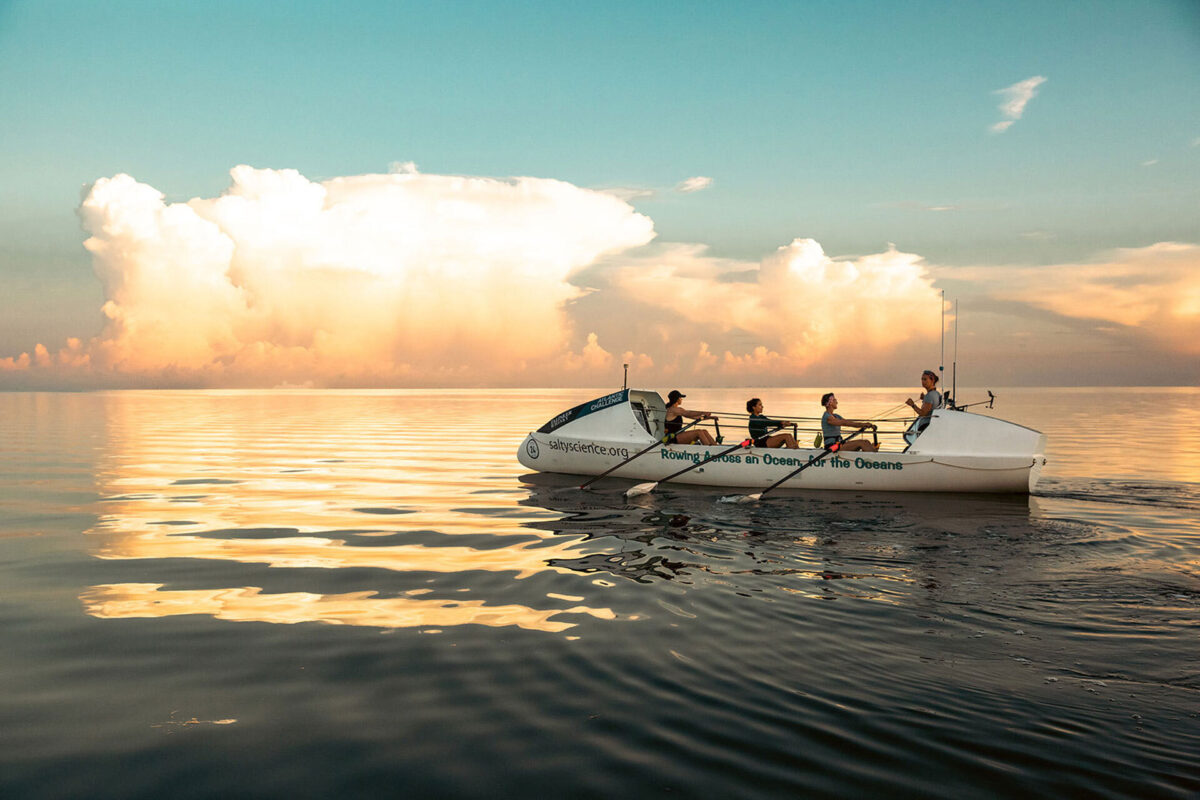Crossing the Atlantic Ocean on a small vessel is a large task, and racing across the Atlantic in a rowing boat is even larger. This is exactly what the four woman team of Salty Science will take part in through the annual Talisker Whisky Atlantic Challenge, in which they will spend between 40 to 60 days at sea, rowing over 3,000 miles - all completely unassisted. Most importantly, the Salty Science team is undertaking this huge challenge in order to raise funds for ocean conservation-related charities.
How Salty Science Was Started
One of the team members, Chantale Bégin, is an avid sailor and a Marine Biology Professor at the University of Southern Florida in Tampa. Chantale has a long personal history of work in marine biology and coral reef ecology throughout the Caribbean and has been involved in many projects dedicated to preserving the health of the Atlantic Ocean. Throughout her many roles, Chantale has focused on teaching and supporting students to perform fieldwork and obtain hands-on experience with marine conservation. Chantale regularly takes groups of students to the Caribbean for field-intensive courses, and it is in this capacity that Chantale met two of her current rowing teammates, Noelle Helder and Lauren Shea. This dedication to conservation shared between Chantale, Noelle, and Lauren, led the three marine biologists to decide on rowing across the Atlantic to raise money to support their cause. Their fourth team member is Isabelle Côté, Chantale’s Ph.D. advisor. This makes the four women a group of three “academic generations”!
Below we spoke with Chantale in greater detail about why she is rowing across the Atlantic with Team Salty Science, which charities they are supporting, how the team is preparing for their journey, as well as the system they have installed to reliably power their long-distance excursion.
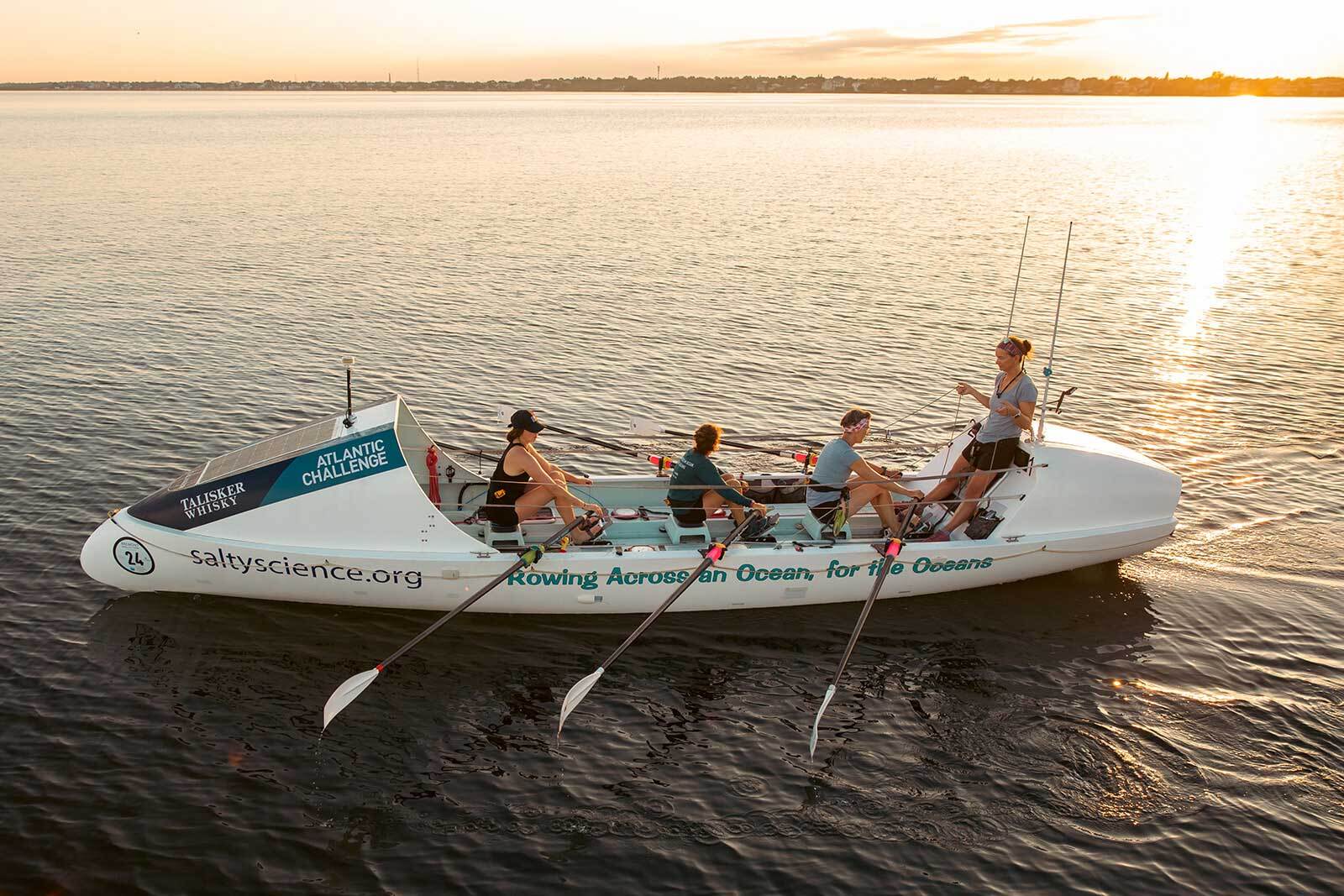
What motivated you to take on this challenge?
“It is our shared passion for adventure that sparked the idea to row across an ocean. And all of us have dedicated our professional lives to marine conservation, so it was a natural fit that we’d choose to support organizations that work in marine conservation. What’s more, we all met in an academic setting and all strongly believe in the importance of experiential education, so we’re really excited to raise funds to inspire and train the next generation of marine conservationists. In 2016 I started a nonprofit organization called Shellback Expeditions, which supports research and monitoring of coral reefs in the Eastern Caribbean. The organization now supports this research in conjunction with field courses that I teach at USF. Salty Science is now a sub-organization within Shellback Expeditions, so as a 501c3 nonprofit organization the funds that we raise through our ocean rowing campaign can be tax-deductible. The four of us are really excited to take on such a monumental challenge, to spend a lot of time on the ocean, and to raise funds for the conservation of oceans in the process."
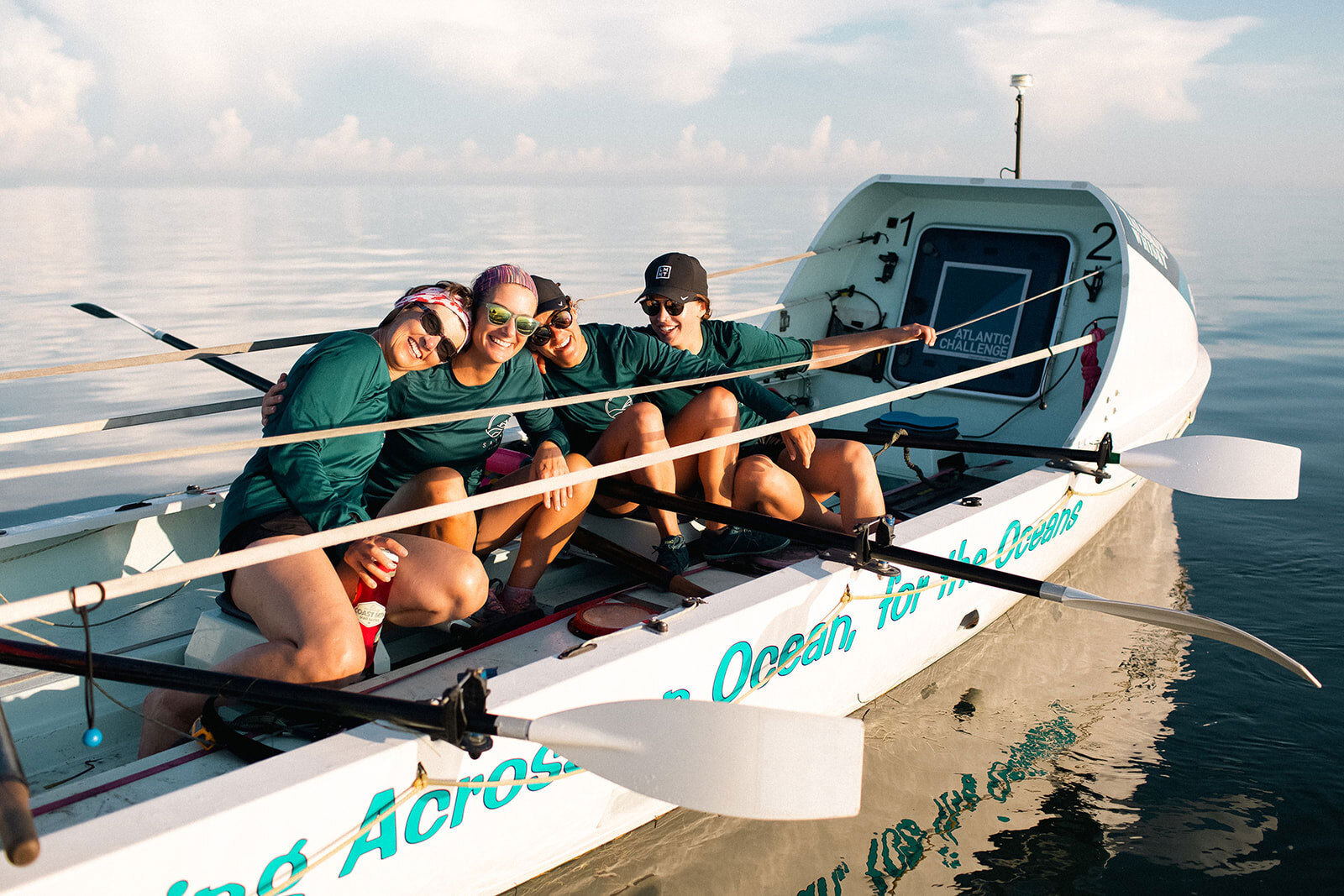
How are you preparing for your journey?
“We are all experienced, on the water, but we are all training hard in many ways to get ready for this race. I am an experienced sailor and have sailed across oceans, but the preparation to cross in a rowing boat is quite different! The preparation is definitely multipronged and beyond the physical training, we need to think about safety and plan a lot of logistics. We are working with a team of trainers who are helping us with our physical and our mental preparedness. We spend about 10 hours a week practicing on rowing machines, coastal rowing boats, and strength training. We all need to refresh our sea survival training, practice using all of the boat’s systems as much as we can, and plan as much as we can to be ready to face whatever situation arises. You never know what can happen out on the water, so we are spending time training on what to do if one of us gets sick while on the boat and making sure that we are having frank talks about our hesitations and fears now before we are out on the water. For my part, I am also reading accounts of others who have crossed the ocean and listening to podcasts and watching documentaries to see what others who have tried to cross the ocean have dealt with because the ocean has many unknowns and uncontrollable aspects about it and this all helps.”
What organizations and causes are you raising money for?
“We have spent a considerable amount of time making sure that we find and work with sponsors and are receiving donations for this race. Our goal is to raise $500,000, which would allow us to cover the cost of the race and us donate at least $100,000 to each of the causes that we are supporting. These three charities are Shellback Expeditions, GreenWave, and Bamfield Marine Sciences Center, which are all dedicated to marine conservation and education. Shellback is the nonprofit that I started which supports research and monitoring efforts in the Eastern Caribbean, in conjunction with university-level field courses. GreenWave focuses on regenerative ocean farming--aquaculture that has a minimal impact on the environment. They continually train new ocean farmers in the techniques they have developed, so that more of our seafood can come from sustainable farms. Finally, the Bamfield Marine Sciences Center on Vancouver Island offers great field courses for marine science students to gain the skills to excel in this field.”
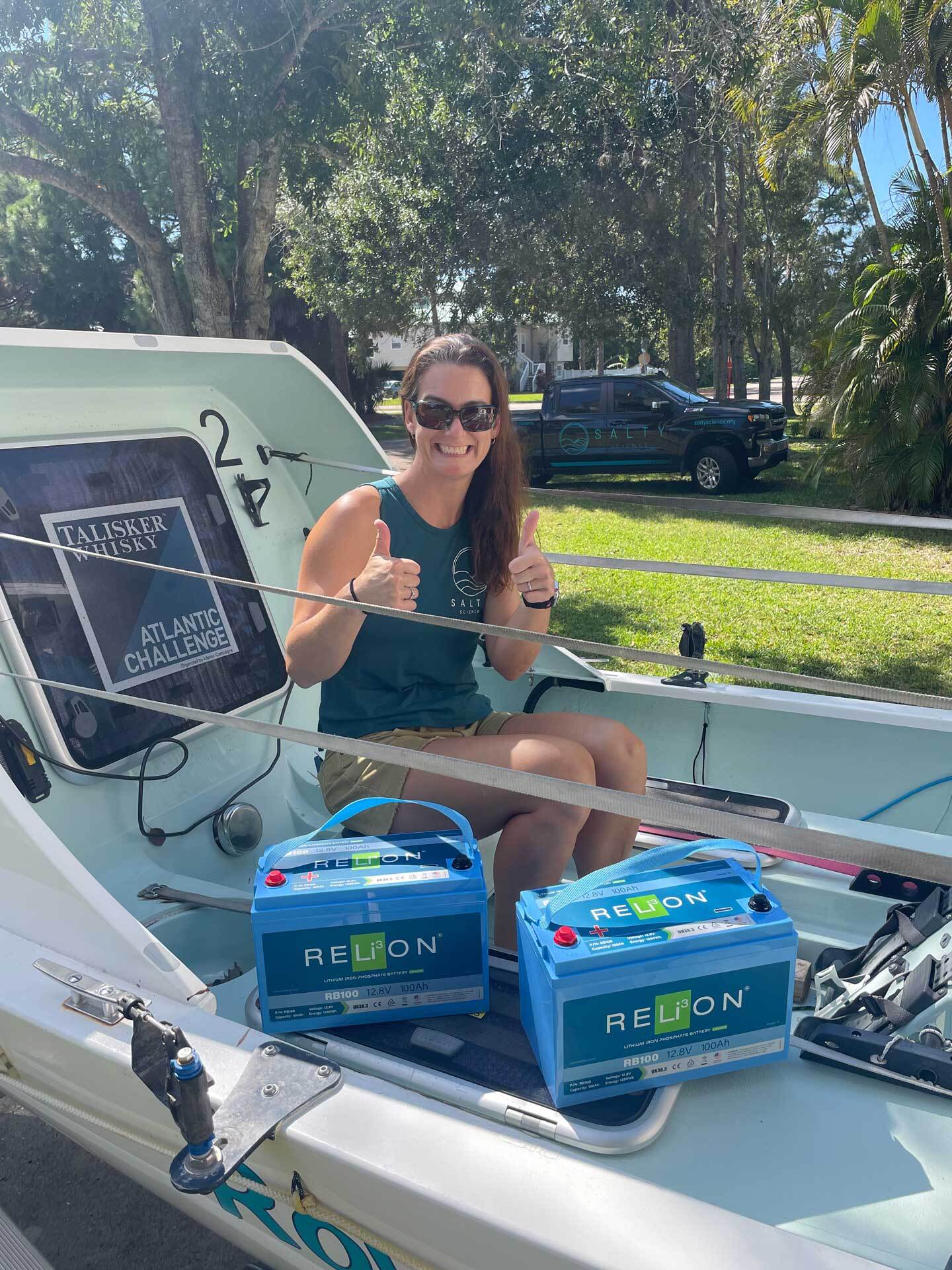
Salty Science’s boat and power system include:
“We purchased an R45 from Rannoch Adventures, a UK boat manufacturer. The boat is powered by RELiON’s RB100 lithium phosphate battery. Our boat is a solar panel-supported ocean rowing boat that is most commonly raced by 3, 4, or 5 people. The boat is very safe and can self-right when it capsizes. There are two cabins on the boat and two people will be rowing at all times, while the others sleep, eat, and do everything else that needs to be done. There is enough room on the boat for 60 days of food and a water maker in addition to electronics, the navigation system, and the navigation lights, all of which help ensure that the boat will be ready for an ocean crossing.”
Why Salty Science switched to lithium:
“We decided on lithium batteries because we knew that they were the most reliable choice for this race. The older batteries we had used in the past needed to be recharged frequently and were still running out of energy too fast and dying on us unexpectedly. Lithium batteries, on the other hand, have retained their energy - while maintaining consistent power, very well. This is really important, as everything on the boat, including critical tools like our water maker, navigation, lights, and satellite phones require battery power 24/7.
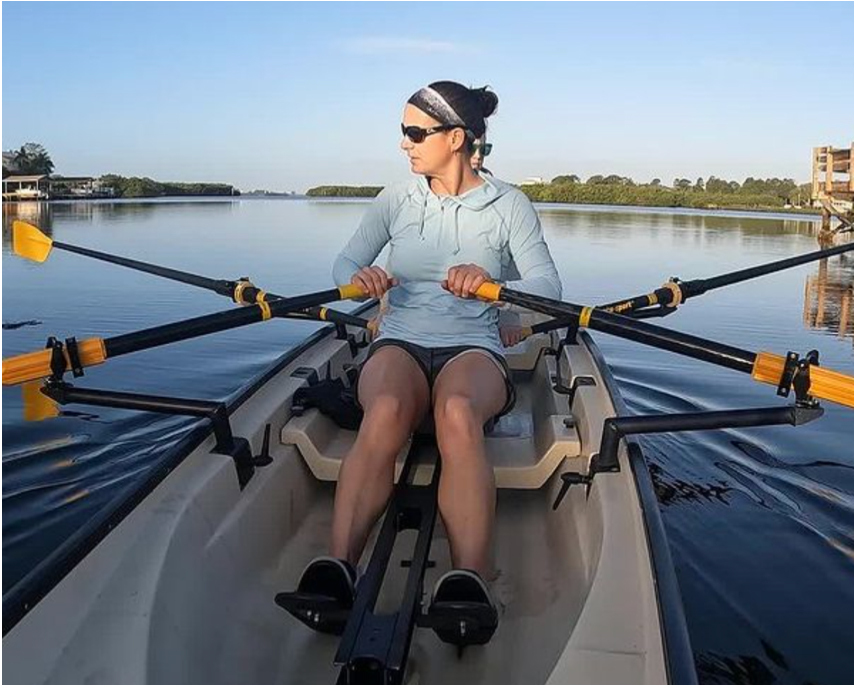
Why Salty Science chose RELiON:
“RELiON was a natural choice, as it was linked to the organization 1% For the Planet, which we respect and trust. The name seemed to come up a lot and once we researched the different options available. RELiON stood out as the right choice for what we were looking for - both in terms of being a mission-driven organization that is deeply focused on sustainability and in being able to provide the power that we needed for the race.”
How Salty Science’s lithium system helped them challenge their limits:
“More than anything, we need to be able to focus on the race and spend as little time as possible worrying about cloudy days and panicking about having to minimize the use of power onboard. We cannot afford to be short on power in this race, and the less time we spend worrying about the battery, the more time is freed up to focus on winning and having a safe journey. With lithium-ion batteries, we can charge them and forget them, which means a large weight is taken off our shoulders.”
Salty Science’s advice for people considering switching to lithium batteries:
“Lithium is one of the best choices you can make if you really rely on your energy in a pressured situation. If you want to have battery power that you do not need to stress about all the time, then lithium is the right choice because nothing is more freeing than being able just to charge your battery and forget about it.”
Interested in learning more about Salty Science and donating to their cause? Check out their website and follow them on Facebook and Instagram. If you’re looking for guidance on the right battery system for your marine application, get in touch with a RELiON expert today.
